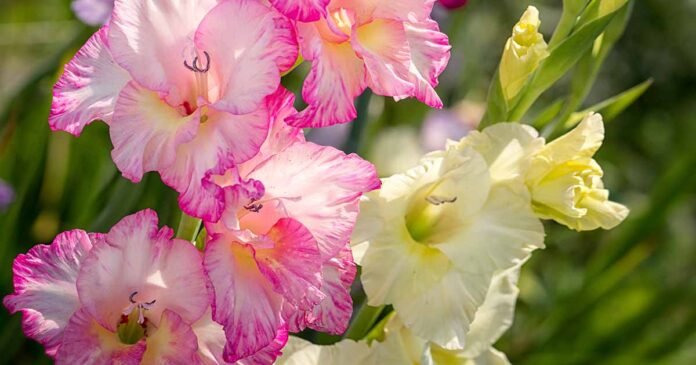Cultivars to Select
The most popular choices for the home gardener are hybrids typically classified as G. × hortulanus.

These are divided into three main groups, all with an extensive range of flower colors.
- Grandiflora hybrids, G. grandiflora, produce large, funnel-shaped and ruffled blooms four to six inches wide on tall spikes three to six feet tall with up to 30 flowers per scape.
- Nanus hybrids are miniature varieties with small, trumpet-like blooms three inches wide on scapes that grow up to two feet tall.
- Primulinus hybrids, G. dalenii, have loose, hooded flowers two to three inches wide on scapes up to three feet tall and often feature contrasting throat blotches.
Dwarf varieties typically grow in the range of 12 to 36 inches tall and make a handsome, upright choice for containers.
Nanus types are popular miniature varieties with soft, pastel colors on scapes that grow up to 24 inches tall.
They also have better cold hardiness than standard varieties and are suitable for cultivation in Zones 5 to 10.
Here are some varieties to consider:
Charming Lady
‘Charming Lady’ is a nanus type with beautiful, bubblegum pink blooms.
You can find ‘Charming Lady’ corms available in packets of 10 at Burpee.
Hardy Dwarf Mix
If you prefer a mix of colors, the Hardy Dwarf Mix features a selection of nanus types with pretty flowers in cream, peach, and pink.
It’s available in packets of 20, 40, or 100 bulbs at Eden Brothers.
Glamini
The Glamini® series (G. grandiflorus) is a handsome choice for containers as plants grow up to 24 inches tall and are hardy in Zones 7 to 10.
The Glamini® Mix offers beautiful blooms in colors of burgundy, pale pink, purple, scarlet, and buttery yellow.
Packets of 24 bulbs are available at Burpee.
Container Choices
If you opt to grow dwarf varieties that top out in the range of 12 to 36 inches tall, pots with a minimum of 12 inches in diameter and height are suitable.
Standard varieties grow much taller, and these need taller pots for a couple of reasons.


The first is that shallow pots make it too easy to overwater the corms, which can lead to root rot and bulb collapse.
Another reason is that taller pots are needed to balance the impressive height, which can look top-heavy in small vessels.
For a visually pleasing look, aim to use containers that are roughly one-and-a-half to two-and-a-half times shorter than the mature plants.
For example, if your plants grow five to six feet tall, choose a pot that’s in the range of 18 to 30 inches in height.
This size helps to anchor the overall appearance and provides a satisfying, harmonious sightline.
Containers can be made of any type of material such as ceramic, fiberglass, hypertufa, terra cotta, or wood.
However, if you plan to overwinter bulbs in their pots, ensure the material can withstand the low temperatures your region experiences.





